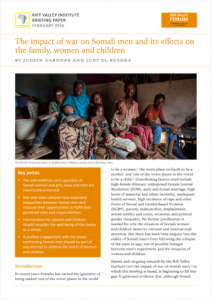In recent years Somalia has earned the ignominy of being ranked ‘one of the worst places in the world to be a woman’, the worst place on Earth to be a mother and ‘one of the worst places in the world to be a child.’ Contributing factors cited include high female illiteracy, widespread Female Genital Mutilation (FGM), early and forced marriage, high levels of maternal and infant mortality, inadequate health services, high incidence of rape and other forms of Sexual and Gender-based Violence (SGBV), poverty, malnutrition, displacement, armed conflict and social, economic and political gender inequality. No further justification is needed for why the situation of Somali women and children deserves national and international attention. But there has been little enquiry into the reality of Somali men’s lives following the collapse of the state in 1991, nor of possible linkages between men’s experiences and the situation of women and children.
Recent and on-going research by the Rift Valley Institute into the impact of war on Somali men, on which this briefing is based, is beginning to fill this gap. It generates evidence that, although Somali society sets exacting standards for men, war and instability since 1991 have severely curtailed their opportunities to live up to these standards and that this has important consequences for women and children, as well as for men.
Asking a range of questions about men, similar to those that gender analysis asks about women, reveals new understandings of what conflict means for men. Its effect on masculine identities has implications for conflict, peace and the well-being of women, girls, men and boys. Two critical theories underpin the analysis in this briefing. Firstly, that gender is a relational concept—that masculine and feminine identities are created in relationship with each other. Secondly, that vulnerability in conflict settings is not confined to women and children. Lessons about male experiences of vulnerability in the Somali context may help national and international actors design more effective policies and interventions that will help children and women, as well as men.
The findings of the research were also published in an article in the Gender and Development Journal.




